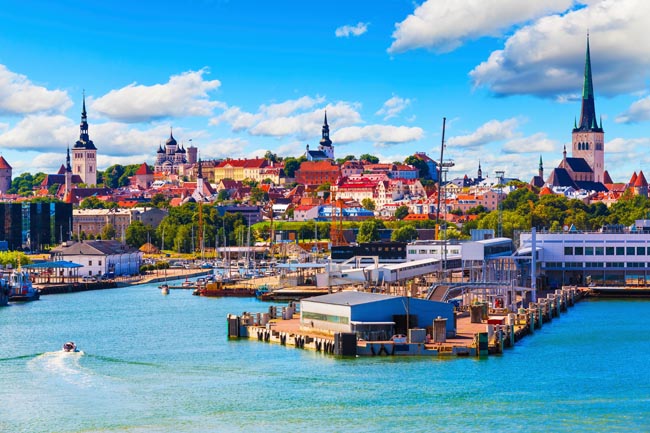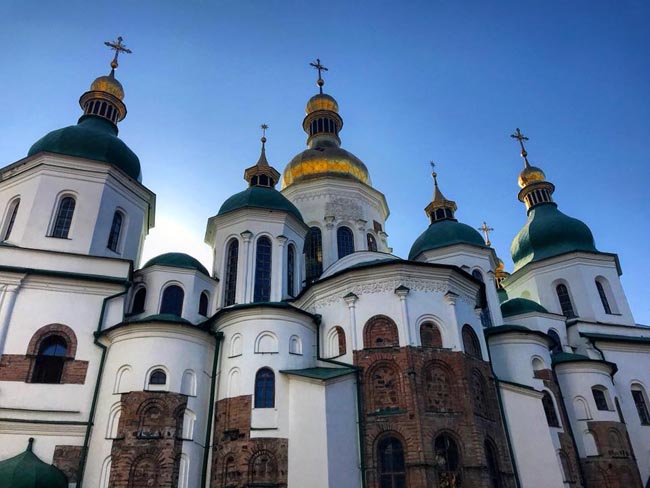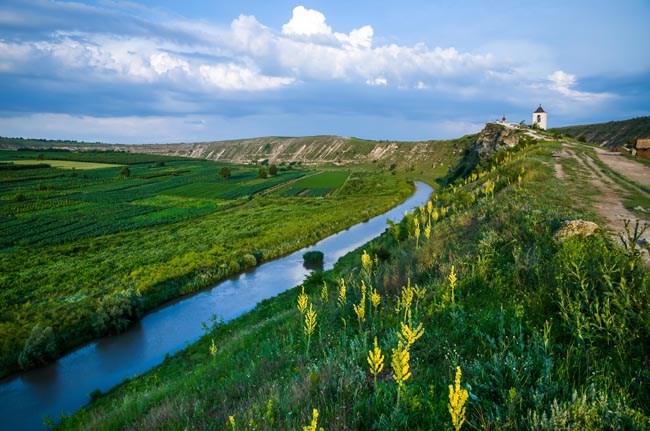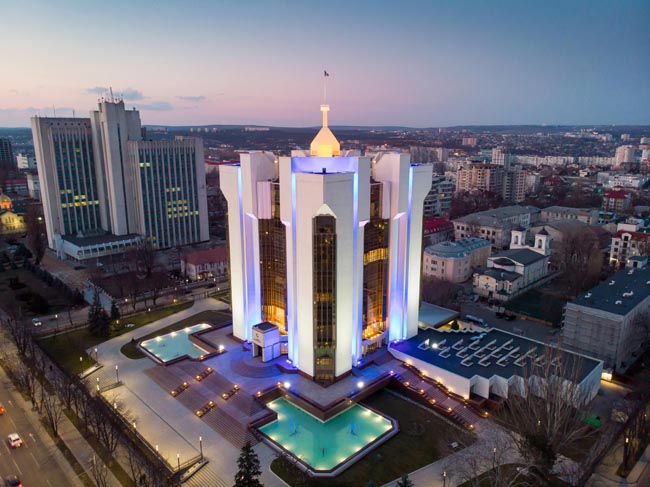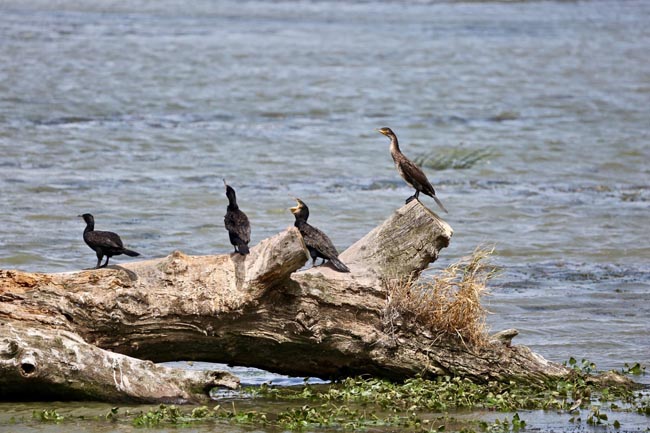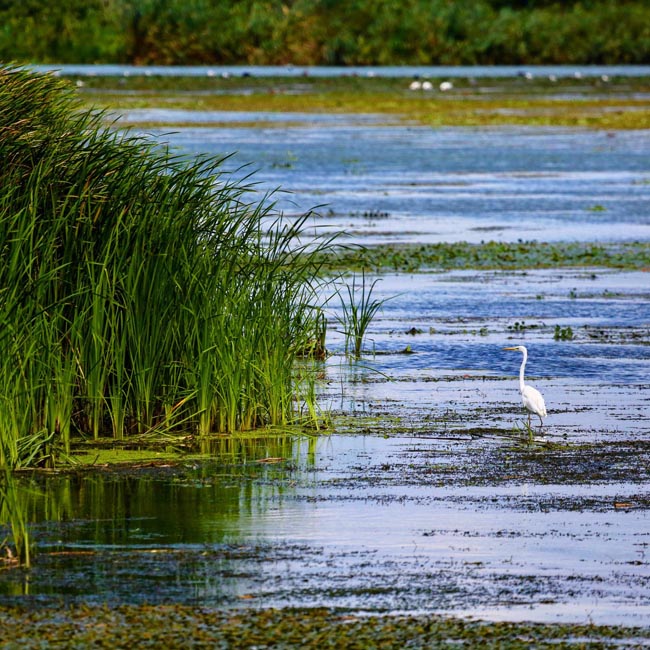This tour was designed by, and will be led by Jonathan Hodgson, who invites you to join him on this fascinating journey:
"I have the pleasure to introduce a tour that encompasses six of the former USSR countries. Adventures Abroad travellers have enjoyed our Baltics tour every year and I wanted to expand our current offering to include time in the rural location of the Curonian Spit, an opportunity to experience a rural and serene side of the region. Our tour continues to the re-introduced destination of Belarus to our roster: a visit to a nation resistant to the many changes ongoing in Eastern Europe, where we will explore the capital, Minsk, and the city of Brest and its remarkable fortress. We continue to Ukraine (and a newly included day-trip to Chernobyl!), exploring the important cities of Lviv, Kyiv, Yalta and the Crimean Peninsula, and Odesa. Our tour finishes in Moldova, focusing primarily on the capital of Chisinau and some exploration of monasteries and a winery or two!"
Download Itinerary
Day 1 Arrival in Tallinn, Estonia
Arrival in Tallinn, capital of Estonia.
Historically, Tallinn has been attacked, sacked, razed and pillaged on numerous occasions. Although extensively bombed by Soviet air forces during the latter stages of World War II, much of the medieval Old Town still retains its charm. The Tallinn Old Town became a UNESCO World Cultural Heritage site in 1997.
Overnight in Tallinn.
Included Meal(s): Dinner
Day 2 Tallinn: City Tour
Today we have a guided WALKING tour of this important Baltic Sea harbour city. We begin with a visit to the Alexander Nevsky Cathedral, built in the nineteenth century. The cathedral dominates the Lossi Plats, and is an imposing testament to the Russian imperialist influence. We also visit the Dominican Monastery, which played an important role in bringing Christianity to Estonia. We have the opportunity to visit the Toompea Castle site, a 13th century castle where the current parliament of Estonia holds its sessions. In the immediate area we will also visit the Toomkirik Lutheran cathedral, founded in 1233, with its impressive carved tombs inside.
This afternoon you will have some free time to stroll through the picturesque Old Town with its jumble of medieval buildings, turrets and walls.
Overnight in Tallinn.
Included Meal(s): Breakfast and Dinner
Not finding what you're looking for?
Our specialists can take away the stress and create a private custom tour tailored to your exact interests and budget.
Day 3 Tallinn - Parnu, Estonia - Riga, Latvia
This morning we depart Tallinn for Riga, visiting Parnu en route. There was a trading settlement in Parnu before the German crusaders arrived, but recorded history of the city dates back to the 13th century. From the middle of the 19th century, Parnu developed as a resort town with its good beaches and relatively good weather. During the Soviet era, Parnu's guesthouses, inns and hotels were converted to sanatoria. We will do a stroll through parts of the Old Town, including the town's oldest building, the Red Tower.
After our stop we will proceed to the border and continue on to Riga.
Overnight in Riga.
Included Meal(s): Breakfast and Dinner
Day 4 Riga: City Tour
Riga, founded in 1201 by the German bishop Albert, is the largest of the three Baltic capitals and boasts an impressive kaleidoscope of various architectural styles.
We start with a panoramic drive taking in some of the most famous sights of Riga. Our route along the embankment of the River Daugava provides us with wonderful views of the city. Our route takes us to the center of town to the Jugendstil District and Alberta Street, an open-air architectural museum and one of the best collections of Art Nouveau buildings in Europe. We then drive through the modern part of the city, observing the university building, National Opera, Academy of Arts and central train station. We will then leave our bus at the entrance to the Old Town.
Our walking tour of the Old Town will include Riga Castle, Dome Cathedral, St. Peter's Church, Swedish Gates, Large and Small Guild Houses, and the Freedom Monument. During your free time, we recommend a visit to the Museum of the Occupation, dedicated to information about Latvia and its people under two occupying totalitarian regimes from 1940 to 1991 (entrance by donation).
Overnight in Riga.
Included Meal(s): Breakfast and Dinner
Day 5 Riga: Rundale Palace
This morning we travel about 90 minutes to a region known as Bauska, where we visit Rundale Palace, an architectural pearl created by architect Francesco Bartolomeo Rastrelli, designer of the Winter Palace in St Petersburg. Construction of the palace was completed only in 1768 and now it is a magnificent sample of baroque style with elements of classicism, with crystal chandeliers, rich stucco moulding, silk wallpaper, collection of paintings, and frescoes by Italian artists. This is the place where leaders of the state, wishing to receive high guests with really regal honours, hosted the royal couple from Denmark when they visited in Latvia.
The balance of the day is yours to further explore this beautiful, compact city on your own.
Overnight in Riga.
Included Meal(s): Breakfast and Dinner
Day 6 Riga, Latvia - Siauliai, Lithuania - Klaipeda - Curonian Spit (Nida)
Today we travel to Nida on the Curonian Spit via Siauliai. At Siauliai, we will stop en route at the Hill of Crosses, located just north of the small industrial city of Siauliai. Siauliai is the Lithuanian national pilgrimage center, and a city of famous cultural traditions and legends. On a small hill stand thousands of crosses that represent Christian devotion and act as a compelling resistance memorial to the German and Soviet occupation. Today newlyweds often come here after their wedding ceremony to ask for God's blessing.
After our stop we will proceed to Klaipeda, the former capital of Prussia, Memel. The city was originally founded by the Teutonic Order, who also established its first castle. It came under Prussian rule after the Napoleonic Wars and stayed so until the end of WWI when it was deemed to be international territory until Lithuanian troops occupied it a few years later. We will have a brief city tour of Lithuania's third largest city before continuing on to the Curonian Spit.
Overnight in Nida (or Klaipeda).
Included Meal(s): Breakfast and Dinner
Day 7 Curonian Spit Tour
The Curonian Spit is a National Park designated area set up in the early 1990's to protect this unique environment formed by the wind and waves of the Baltic Sea, coupled by massive deforestation stemming from a couple of centuries before. Dunes shift along a narrow band of land, bordered by the crashing surf of the Baltic Sea to the west, and the calm Curonian Lagoon borders to the east. Local fishing villages survive now due to both their famed smoked fish and to the growing interest in tourism to the region.
During our time on the Curonian Spit, we will have the opportunity to visit the bizarre Witches Hill, covered in sculptures resembling creatures of fairy tale and fantasy; visit a viewing platform to spot Cormorants and Grey Herons; the 1888 Evangelical-Lutheran Church; Thomas Mann Memorial Museum; the Ethnographic Fisherman’s Museum; the Amber Gallery Museum; and the Neringa History Museum, amongst other sights. We will also be able to appreciate the dunes that dominate much of the Spit. For those who are keen walkers, your tour leader will provide an option to go on one of the many walks that abound to take advantage of the beautiful landscape.
Overnight in Nida (or Klaipeda).
Included Meal(s): Breakfast and Dinner
Day 8 Curonian Spit - Kaunas - Vilnius
Today we travel to Vilnius via Kaunas to see the Castle and Old Town at the confluence of the two largest Lithuanian rivers, the Nemunas and the Neris. We see the Town Hall Square, lined with 15th-16th century merchants' houses, and the 17th century baroque Town Hall dominating its center. Nearby Kaunas Cathedral and Gothic Vytautas Church dominate the riverbank. After our visit we continue north to Vilnius.
In 1994 the Old Town of Vilnius was included on UNESCO's World Heritage list. With its diverse architecture and colourful history, Vilnius is a cosmopolitan place, though with just 543,000 inhabitants, it has an almost village-like atmosphere, making it an easy place to get to know.
Overnight in Vilnius.
Included Meal(s): Breakfast and Dinner
Day 9 Vilnius & Trakai
This morning we travel to Trakai, a former capital of Lithuania. The town, situated on the shores of several lakes, has two prominent castles built to fend off German knights in the 14th century. Trakai is famous for its population of Kara-Kalpak people. Brought to Trakai from the Crimean Peninsula by the Grand Duke Vytautas in the late 14th century, the Kara-Kalpak still hold their Jewish religious services in the yellow Kinessa, built in 1812. Our tour here includes a visit to the Trakai Historical Museum, housed within the main rooms of Trakai's island castle.
We return to Vilnius for a lunch break and town tour.
Sweden, Poland, France and Russia have all ruled Vilnius in the past, and this afternoon we will witness the influences that this has had on this beautiful city. The Old Town is one of the largest in Europe, with nearly 1,500 historic buildings of note built over several centuries creating a splendid blend of many different architectural styles.
Our walking tour will take us to Cathedral Square in the heart of the city. Inside the cathedral we see the famous chapel of Saint Kazimieras, considered an architectural gem. Rising in the distance behind Cathedral Square is the Gedimino Tower, once part of the 14th century defense system. We will also see the baroque Peter and Paul Church, originally built in the 14th century. The Gates of Dawn, on the eastern side of the Old Town, were one of the original nine gates into the city. The original Gothic defensive wall was once over 2 km (1.5 miles) long. From this remaining gate we will walk down through the streets of the old town. Nearby is the Jewish Quarter, with its cobblestone lanes and hidden courtyards.
Overnight in Vilnius.
Included Meal(s): Breakfast and Dinner
Day 10 Vilnius, Lithuania - Minsk, Belarus
Today we depart for the border between Lithuania and Belarus. Hopefully, our border crossing will be reasonably fast, though this may be subject to the still strict protocol of Belarusian officials.
After completing border formalities, we will drive onward to Minsk, the capital of Belarus.
Belarus, part of the Newly Independent States, (N.I.S.) is a vast country with stretches of unbroken birch groves, large forested marshlands and gently sloping green fields amidst wooden villages that time forgot in the 18th century. Belarus borders Russia in the north and east, Poland in the west, Latvia and Lithuania in the northeast and Ukraine in the south. Minsk is the capital of Belarus and was completely rebuilt after the Second World War.
Overnight in Minsk.
Day 11 Minsk: City Tour & Dudutki Folk Museum
In a country rich in war memorials, Minsk is the greatest of all testimonies to the atrocities of the Great Patriotic War. It's estimated that nearly half of the city's population perished during WWII. Today, Belarus is striving to balance the preservation of its independence with the need for economic partnership with neighbouring Russia.
Today we have a city tour including Independence Square with the House of Government and "Red" Krasny Roman Catholic Church; Victory Square with its tall grey obelisk and eternal flame honouring the heroes of World War II; Troitskoye Predmestye (Trinity Suburb) -- restored buildings of the 19th century, Holy trinity Cathedral and St.Catherine's Church -- architectural monuments of the 17th century.
Our attention then shifts to Belarus as an ancient country with rich history and folklore. We visit the Dudutki Complex, created in order to present the oldest forms of culture and daily routine of the medieval people of Belarus to younger generations and foreign visitors of the state. The founders of the complex pursued the goal to restore a 19th century Belarusian manor with all the subsidiary services and workshops that existed here only decades ago. These include stables, pottery, forge, cheese dairy and several others – all in full order and operational. In the course of the tour you will hear about the development of the Belarusian village and the history of folk crafts that were practiced by the local peasants to improve their standard of living.
Overnight in Minsk.
Included Meal(s): Dinner
Day 12 Minsk - Nyasvizh & Mir Castle - Brest
Today's (full-day) journey takes us to Nyasvizh, a great place to get in touch with Belarus's past. This quiet but green and attractive town is one of the oldest in the country, dating from the 13th century. It reached its zenith in the mid-16th century while owned by the mighty Radziwill magnates, who are responsible for building the palace that is the town's most outstanding attraction.
We continue to Mir Castle (Mirsky Zamok), an outstanding example of 16th-century fortification art. In 2000 UNESCO designated Mir Castle a World Cultural and Natural Heritage site for its successful blend of Gothic, Baroque and Renaissance architecture making it one of the most impressive castles in Europe.
We continue to Brest, first mentioned in 1019 as Bierascie. It is believed that ancient city's name comes either from the word "bierast" -- a species of elm, or from the word "bierasta" meaning birchbark. The city's name was changed several times during its history. In the beginning of the 18th century the city's ancient name was changed into Brest-Litowsk. New name lived till the beginning of the 20th century when its second part was discarded and the city has become simply Brest.
Overnight in Brest.
Day 13 Minsk, Belarus - Fly to Lviv, Ukraine
Today we fly to Lviv, Ukraine.
Lviv is the "capital" of Western Ukraine and one of the country's most impressive cities. Founded in the 13th C. by King Danylo Halytckyj, it was named in honour of his son Lev (Leo). Through centuries of Polish, Austrian, and Soviet occupation, Lviv was the gateway to "the East", but with independence in 1991, Lviv is finally free to develop its own Ukrainian identity.
Flight time permitting, we may begin our sightseeing program upon arrival.
Overnight in Lviv.
Day 14 Lviv: City Tour
Lviv, a UNESCO World Heritage Site, has a rich and impressive history. Numerous historical events are concerned with the city and Lviv buildings still keep the spirit of past centuries; cozy streets and fascinating monuments make it a unique attraction among the Ukrainian and Eastern European cities.
Lviv's architectural landscape joins the monuments of numerous styles and different epochs. We will have a 3-4 hour walking tour of the centre of L'viv that will include an orientation of the traditional limits of the old town. We will view the Renaissance-style Bernardine Monastery, the Armenian Church and the Cathedral of Dominicans, amongst other important architectural marvels that give this city its character.
Typically we finish our tour close to the Opera House (exterior) which is located nearby to your hotel. With your free time in the afternoon you may choose to take the opportunity to visit the many small museums, including the Old Pharmacy Museum, Lviv Historical Museum, and the Museum of Ethnography and Crafts. There is also a chance to climb the many steps up to the viewpoint above the central Rynok Square at L'viv City Hall.
Overnight in Lviv.
Day 15 Lviv - Kamianets-Podilskyi
Today we drive to Kamianets-Podilskyi. After we check in to our hotel we'll embark upon a afternoon visit of town and fortress. No epithet is able to describe fully the splendor of this ancient city, which no other city can match, even in Europe. An incredible quantity of amazing 11th-19th centuries monuments and landmarks are concentrated on the territory of the Old City. They are a big reason why this city is on the list of UNESCO World Heritage Sites.
Despite the twists in history, Kamianets-Podilskyi has managed to preserve its priceless buildings almost unchanged. The main sight is still the Ancient Fortress, considered to be one of the best samples of fortification buildings in Eastern Europe. In the towers and dungeons of the fortress are unique exhibitions, which brightly illustrate the pages of Kamianets-Podilskyi's history: scenes of medieval trials, defenses of the fort, and weapons collections are all depicted. The sacral architecture of Kamianets-Podilskyi is no less impressive – it fascinates with its richness and variety of represented cultures.
A special place among the treasures of the city belongs to the Armenian Cathedral and to the St. Peter and Paul Catholic Church, an example of the beauty that combination of two different religious architectures can bring. The complex of the Dominican Monastery also bears the imprints of different epochs and styles. And St. Nicolas's Catholic Church, included in the complex, is considered to be one of the most ancient city temples. Because of so many historic monuments, Kamianets-Podilskyi gives you the opportunity to dive into a truly medieval atmosphere.
Overnight in Kamianets-Podilskyi.
Day 16 Kamianets-Podilskyi, Ukraine - Soroca, Moldova: City Tour
Today we cross into Moldova.
Although not well-known, Moldova offers some attractions that would surprise even the most seasoned traveller. Little Moldova has a landscape covered with vineyards, pristine forests and lakes, medieval monasteries and fortresses, wine caves stretch for miles, a rich history, and eight ethnic nationalities. A chronicler once called Moldova "a country on the way of all disasters". Indeed the territory of Moldova is located on the boundary of Eastern and Western Europe and has been populated from ancient times. The earliest leavings are of the post-Paleolithic times, then the Chernyakhovskaya culture, and the treasures of the Romans, to the 4th century AD, the Slavonic settlements in the 8th-9th centuries. The ancient Romans and wandering tribes that used to migrate over this territory left vestiges of their stay.
En route we stop at Khotyn Fortress, one of the most popular objects of the kind in Ukraine. This fortress impresses with its power and impregnability and is one of the best-preserved fortifications on the continent.
We continue to Soroca and a city tour on arrival. The city is famous for the impressive walls of Soroca fortress, whose historical interest is reflected in its walls preserved since the Middle Ages. Gypsy Hill is a Unique Quarter of the Gypsies, settled purely by the Roman people led by a gypsy baron in Moldova. During Soviet times they managed to successfully combine their customs with those of local inhabitants. Later the hills of Soroca town got the name "Hill of Gypsies" where the elegant houses and buildings under the name "Swallow's nest" were built.
"The Candle of Gratitude" was lit on 27th March, 2004 to honour the author of a well-known Moldavian ballad "Miorita". It's actually a church in shape of a burning candle made of stone. An amazing view from this striking building opens to the river Nistru.
Overnight in Soroca.
Day 17 Soroca - Orheuil Monastery - Chisinau
Today's route takes us to Orheuil Monastery.
Among Moldova's greatest wonders are its monasteries, and we visit the most famous, the cave monastery in Orhei Vechi. This 13th century church was excavated from a limestone cliff by Orthodox Christian monks who believed the cave would be resilient against invaders. Archaeologists have recently discovered ruins of Turkish baths and a protective wall built in the 15th century, which surrounds the religious complex. Stefan the Great erected a fortress in Orhei Vechi in the 14th century, destroyed by Tartar invaders in 1499. The monastery was inhabited until the 1th century; closed during Soviet times, it was reopened in 1996 and services are now held regularly.
We continue to Chisinau, the capital of Moldova.
Overnight in Chisinau.
Day 18 Chisinau: City & Wine Tour
The history and life of Moldova through the centuries is best presented in the History and Regional Lore Museum, a beautiful Turkish-style complex, which we will visit along with the Fine Arts Museum, which houses good examples of Russian, West European, and Moldovan paintings, sculpture and applied arts.
A visit to Moldova would not be complete without a trip to the Moldovan wine country. We visit Cricova, the world's largest wine cellar. It is actually a subterranean city with winding streets extending for 60 kilometres (37 miles). The street names orient visitors toward Str Cabernet, Str Pinot or Str Merlot. There are over one million bottles of white wines -- 648 types are stored in the cellars at a uniform temperature of 12C (54 F). A tour of Cricova is one of the best ways to sample the wide variety of Moldovan wines and champagne, which are gaining great popularity outside Moldova's borders, including Western Europe and North America.
Overnight in Chisinau.
Day 19 Chisinau - Bendery - Tiraspol
We depart Chisinau for the town of Bendery, the site of a fortress commanding the Dneister crossings since the second century BC. The original 12th century fortress wall was built by the Genoese who traded actively with Black Sea ports and fell to the Turks in the 16th century. The rectangular fort with its citadel was built by the Turks in the 1530's and was besieged several times by the Russians in the 18th century as part of their drive for Bessarabia. It was all but destroyed in the German retreat of 1944.
We continue our journey, traversing the valley of the Dneister River with its orchards and vineyards. Our destination is Tiraspol, 'capital' of the disputed Transnistria (or Transdniestria) region. The city was founded as a stronghold by General Suvorov in 1792 but named after the ancient Greek colony of Tiras. Built in the grid pattern of 18th century "new towns", Tiraspol retains traces of the original fort. Some of the older houses, with their traditional Moldovan balconies, betray a Turkish influence. Our tour will also include a visit to the famous "cognac" factory.
Overnight in Tiraspol.
Day 20 Tiraspol, Moldova - Odesa, Ukraine
We drive to Ukraine border and continue to Bilhorod-Dnistrovsky. En route we visit the impressive fortress on the banks of the Dnister River. Stefan II of Moldavia founded the 13th century fortress, one of the Ukraine's largest, on a strategic spur of land overlooking the Dnister estuary. The drive to get here is picturesque, taking us through a rural region of quiet villages, farmland, rural communities, and providing us with an occasional view of the Black Sea.
Continue to Odesa.
Overnight in Odesa.
Day 21 Odesa: City Tour
From ancient times, Odesa (Odessa) was inhabited by Scythians, Sarmats, Greeks, and Slavs. In the times of Kyiv Rus it was a part of this huge Slavic state. In the 13th century it was annexed to the Tartar-Mongol empire, the "Golden Horde". At the beginning of the 15th century it was annexed to Lithuania, and in some 50 years, to Turkey. In 1791 the territory became a part of the Russian Empire.
Today we enjoy a half-day city walking tour, including many architectural sites of 19th & 20th centuries, many of them designed by world famous architects and engineers. Most notable are the Opera House (resembling the Vienna Opera and the Dresden Court Theater built in 884-87); the Marine (Potyomkin) Stairway (1837-41) – one of the largest stairways in the world; and the heart of Odesa and immortalized in Sergei Eisensteins's 1925 film, Battleship Potemkin; Deribasivska (Deribasovskaya) Street with plenty of shops, cafes and restaurants. We will also visit the five-domed Uspensky Cathedral.
There will be some free time in the afternoon; Odesa is a great city for walking and this free time will give you a chance to do some exploring on your own.
Overnight in Odesa.
Included Meal(s): Dinner
Day 22 Odesa Catacombs - Fly to Kyiv
Today we board our coach for a visit of the Odesa Catacombs, created nearly 200 years ago during mining of building materials that were used to build the city. Currently it is the maze of 2500 km of entrances, exits, caves, and tunnels. During the WWII campaigns, in 1941, when the German and Romanian armies occupied Odesa, the Soviet military headquarters gave the order to organized the partisan resistance, and the catacombs were chosen as the camp for the partisans. Their store of provisions and weapons allowed tham to survive underground for half a year. The partisan unit was fighting against the Nazi and Romanian army during the entire period of occupation. We will also take the oppportunity to visit Launcheven Beach to get close to the Black Sea.
We then transfer to the airport for our flight to Kyiv.
Overnight in Kyiv.
Day 23 Kyiv: City Tour
Today we have a full day touring Kyiv, including the cathedral of Hagia Sophia, the oldest cathedral in Ukraine. Founded in the early 11th century, and largely rebuilt during the 17th and 18th centuries, it is now a museum with beautiful Christian frescoes. St Sophia Cathedral is inscribed on the UNESCO list of the most important monuments of the world's cultural heritage. We also see the Golden Gate, St Andrew's Church, designed by Rastrelli, the famous architect who built the world famous Winter Palace in St.Petersburg; St Michael's Monastery, monuments to Yaroslav the Wise, Princess Olga, and the monument to Prince Vladimir.
We also visit the Kyiv-Pechersk Lavra Monastery where we will be able to see the famous caves, one of the most sacred places of Orthodox Christianity. The museum boasts a wealth of precious historical items and collections of ancient books and icons.
Overnight in Kyiv.
Included Meal(s): Dinner
Day 24 Kyiv & Chornobyl
Today we embark on our full-day tour to the site of Chornobyl ('Chernobyl' is the former Russian spelling)*. Of course, Chornobyl is well known for the nuclear accident that occurred there on April 26th, 1986 at the power plant that was under the jurisdiction of the USSR. This is considered to be one of the worst nuclear disasters in history as the contamination spread across much of Europe and the western USSR.
Our tour will include access to the 30-kilometre Exclusion Zone where we will get a briefing on the practices used to de-contaminate the area and to visit the town of Chornobyl, including the Wormwood Star Memorial, the St Ilya Church, and the memorial to "Those Who Save The World". Our tour will proceed to the 10-kilometre zone where we will take in the remains of Kopachi Village and Pripyat town and a close view of Reactor Number 4.
Tours have now been running to the Chornobyl site for some time and we will be given a briefing on the site visit with regards to safety issues, but there is no reason to be alarmed for one's safety provided we follow their instructions on how to conduct the sightseeing.
* PLEASE NOTE that you must come prepared with long sleeves and trousers (no skirts) and closed shoes only for this excursion. Failure to comply will result in your non-participation.
We will return to Kyiv after a full day.
Overnight in Kyiv.
Included Meal(s): Lunch
Day 25 Departure from Kyiv
Departure from Kyiv.
PLEASE NOTE that past travellers have commented on Kyiv's wealth of attractions and that it would be a great place to extend for some independent sightseeing.
SAFE TRAVELS!
Inclusions
Breakfast and dinner (hotels & local restaurants) daily. All transport, sightseeing and entrance fees for sites noted as 'visited' in the detailed itinerary. Gratuities for local guides, drivers, restaurant staff, porters. Airport transfers for land & air customers arriving / departing on tour dates.
Exclusions
International airfare to/from the tour. Tour Leader gratuities, lunches, drinks, personal items (phone, laundry, etc), domestic and international air taxes (if applicable), excursions referenced as 'optional'. Airport transfers for Land Only customers. Our post-reservation trip notes offer further guidance on optional meal costs and shopping.
Seasonality and Weather
We can expect overall weather conditions to be variable, with cooler temperatures (sweater/jacket needed) possible in the Baltic countries, particularly close to the sea. Hotter and humid temperatures likely in Belarus, Ukraine, and Moldova as we move into early summer.
Transport and Travel Conditions
Land transport throughout by private air-conditioned motor coach, 24-36 seats depending on ultimate group size (see 'group size'). Though we will have a couple of full bus days there are plenty of stops of interest. Multiple walking tours on uneven surfaces.
Am I suitable for this tour? Please refer to our self-assessment form.
Activity Level: 1
No particular physical activity is involved other than town/city walks and short walks to dinners and sites of interest, some of which are large.
To learn more about the Activity levels, please visit our tour styles page.
Accommodation
Well-located, air- conditioned, mid-range hotels (3-4 star) throughout. Many are smaller properties (3-4 story) that may not have elevators. All hotels have en suite bath, though most have shower only. Porter service is rarely available; you MUST be independent with your luggage. Single rooms are limited and likely smaller than twins.
Staff and Support
Tour Leader, driver, local step-on guides in various locales.
Group Size
10-18 plus Tour Leader
Regions visited: Central And Eastern Europe
Countries visited: Estonia; Latvia; Lithuania; Belarus; Ukraine and Moldova
*The red tour trail on the map does not represent the actual travel path.
The following is a list of sample hotels at some locations included on this tour. The hotels shown here are meant to provide a general sense of the standard of hotel we usually aim for; they are not necessarily confirmed for your chosen departure.
























